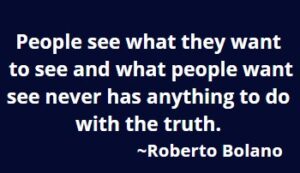Have you ever been accused of favoritism or playing favorites?
The perception of playing favorites or favoritism is something we hear in the employment world our entire career.
- Talking to one employee too much – they must be management’s favorite
- One employee gets promoted of another – they must be management’s favorite
- If an employee is seen in a leader’s office too frequently they must be management’s favorite
The “why” behind these things is never taken into consideration.
- The employee asked for help on something
- The promoted employee repeatedly went above and beyond and worked hard for that promotion
- The employee may be dealing with a very personal issue
It is the role of business leadership to support their workforce.
Leaders do their best to provide support with as much confidentiality and discretion as possible. However, the workforce will always create their stories based only on what they see. It is their perception. Oftentimes, their perception is that leaders have favorite employees. HR professionals and other leaders are regularly scrutinized as playing favorites. Throughout my career I and many other leaders in my tribe have been accused of favoritism or playing favorites. While this was not only an unfair statement, it was untrue. Regardless, ideas of favoritism were the perception of the workforce. The perception of the workforce is significant and it is powerful.
Favoritism can be damaging
Favoritism can cause organizational damage as well as personal damage to your team members. If your organization thinks you play favorites, it can be damaging to your reputation. Oftentimes, favoritism is the perception of the workforce. Favoritism can also be a very real issue. The question is: Do you play favorites with your team members?
Do you have employees that you count on or lean on it times of need?
Of course you do. It is not an intentional action but you are working for the success of your business and you are naturally going to support those that are also working towards that same success. Support does not equate to favoritism. Despite your best efforts to combat that perception, the workforce views it differently. Their perception is their reality. Ultimately, we want an organization of high performers but the reality is, some are going to perform better than others.

In the absence of the truth or open communication, your teams will create a story. The challenge for HR professionals and business leaders then becomes whether or not they are treating employees consistently. Are you consistent in the treatment of your workforce? You darn well better be.
How do you avoid or limit the perception that you have favorites?
- Work with all members of your team equally
- Make your decisions based on facts
- Do not do for some what you would not be willing to do for all
- Maintain the boundaries of leadership equally among your team members
- Give recognition to all good, quality work, not simply some
Some employees may need an additional attention
If additional attention helps your employees on their path to success, then by all means, help them. Additional attention does not equal favoritism.
Communicate with your teams
Let them know that they all deserve the same opportunity. Your team must understand that you want the same success for everyone and that a little bit of attention to an employee does not mean they are your favorite. Perhaps all it means is they need a little extra help and it is your job to coach them on how get there. You want your employees to understand that it is up to them to put in the time and effort to become better or to advance. You will always have employees that buy-in to the rumor that business leaders play favorites but as the leaders, we must use caution not to let the rumors get in the way of doing the right thing.
In the end, you cannot combat the stories your employees create in their heads. You can take steps to avoid accusations of favoritism. Conduct yourself with honesty, integrity and consistency. Have conversations and open communications with your team. Don’t be afraid to talk with your employees. It is important for business leaders to try to understand why employees perceive the way they do and in turn, you can help your employees understand (within confidentiality limits) why you lead the way you lead. Communication is always key to understanding. If you can help some employees understand, perhaps they will share with others. Lead with transparency whenever possible. Be a leader with open communication with your team. Behave with integrity and authenticity.
